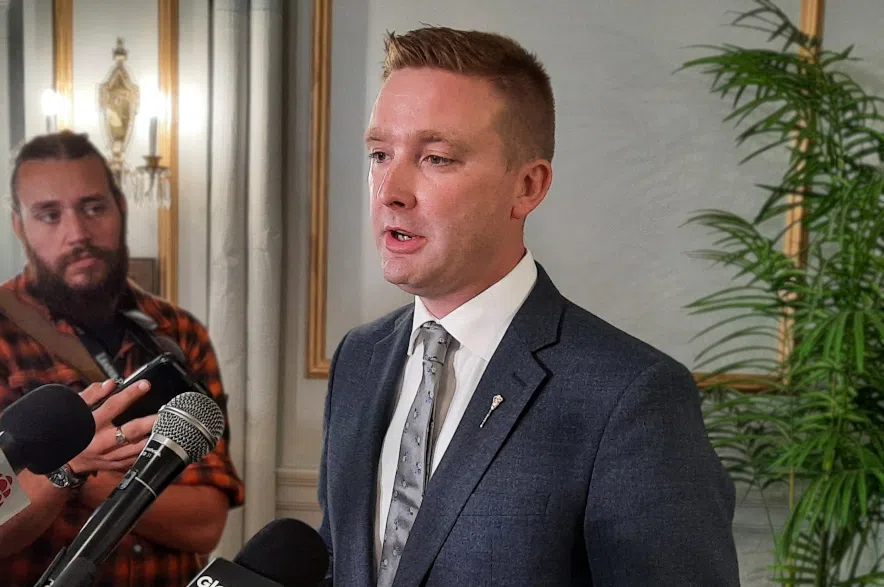Saskatchewan Teachers’ Federation president Samantha Becotte said Thursday she’s “cautiously optimistic” about returning to the bargaining table with the provincial government for two days starting Monday.
“We are ready to negotiate all through the day (and) all through the night if needed to reach an agreement with this government,” she said during a video conference call.
The government put forward a new offer Wednesday, prompting the teachers’ union to call off all planned job action. That included rotating strikes like the one in Saskatoon on Wednesday and the planned withdrawal of lunch-hour supervision.
Becotte said the union has approached negotiations “in good faith,” which is why the sanctions were suspended on Wednesday.
If an agreement isn’t reached between the two parties after two days of bargaining, Becotte said further sanctions could be announced, noting a 48-hour notice would be given.
On Wednesday, Education Minister Jeremy Cockrill announced in a social media video that the province has authorized the Government-Trustee Bargaining Committee to offer a new mandate for teachers.
That mandate is to negotiate an extension of the current salary offer already on the table, or to negotiate that teachers will receive the same annual salary adjustments the same way that MLAs receive them.
Becotte said she’s disappointed the mandate’s announcement has come this late, but is happy it’s happening sooner than later. She has agreed with Cockrill that the best deals happen with negotiations, and at the bargaining table.
Becotte said over the past three rounds of bargaining, the top priorities for teachers have not changed.
“We need to see improvements to teachers’ compensation (and) we need to see improvements to students’ learning conditions and teachers’ working conditions,” she told reporters Thursday, adding the union wants funding to be provided to school divisions.
Becotte added any agreement that doesn’t include classroom complexity is insufficient.
Over the multiple one-day strikes that took place in the last month, Becotte said there has been an overwhelming amount of support from the public for the 13,500 teachers the union represents.
She said the erosion of support in schools has occurred over the last decade, and doesn’t expect all issues to be solved in one year or a contract.
She said she is hopeful that next week’s negotiations will include a commitment of improvement from the province where classroom complexity can be addressed, and that a tentative agreement can be made between teachers, the province and school boards.
Education minister also eager to see talks resume
Cockrill told reporters Thursday at the Legislative Building that he was optimistic about the return to the bargaining table.
Cockrill said the disruptions cause challenges not only for educators but for school division staff and parents.
“Where we are going to get a deal done is when our bargaining committees are at the table and earnestly working to get a deal done, so it’s encouraging that that’s going to start again next week. We’re hopeful for a good result out of that,” he said.
Cockrill said the government is looking to make a “strong commitment” to education in the upcoming budget.
“While we know there’s challenges and (there are) parents and teachers concerned about that, we share that concern,” he said.
“We want a quality education system in this province because we want our next generation to be able to participate in what we think is going to be some pretty exciting growth in the province over the next several decades.”
Although the Government-Trustee Bargaining Committee has been given a new mandate, Cockrill said the province is holding firm on its stance regarding class sizes and complexity — which he says are two separate issues.
Cockrill is maintaining that dealing with those issues should be left to school divisions. He said that position is informed partly by talks with former teachers and school divisions themselves.
“There’s varying situations on what classrooms look like,” he said. “That’s why we leave it to school divisions and school communities to try and say, ‘OK, if there’s a classroom of (40 children), how do we add additional supports to support the teacher and make sure that kids in that classroom have the supports that they need to be successful and get a quality education?’ ”
Cockrill was also asked if there is any utility in fast-tracking long-term substitute teachers who are looking for full-time employment into full-time positions within school divisions. He said he hasn’t had time to consider that.
“I would be certainly looking for feedback from school divisions on a specific issue like that when it comes to how they staff,” he said.
— With files from 980 CJME’s Daniel Reech












